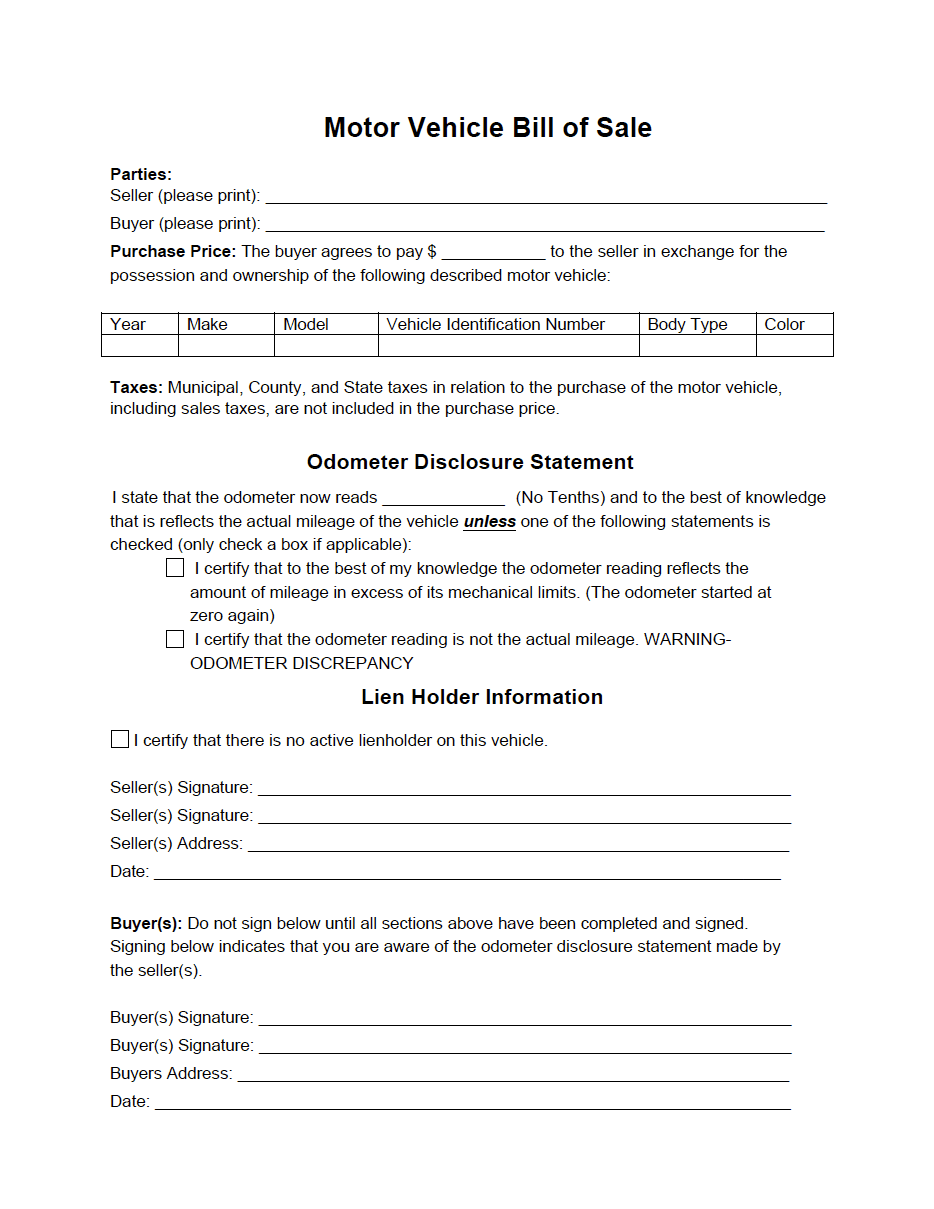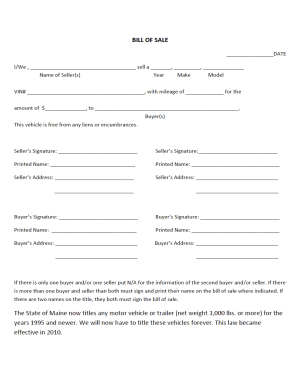Maine Motor Vehicle Bill of Sale Form
A Maine motor vehicle bill of sale form allows owners to register and title their cars. The state does not grant certification without the completed document. It holds importance because it includes the personal information of both parties and the vehicle. Providing these details, along with signatures from the buyer and seller, proves they agreed to the listed conditions.
|
What is a Maine Car Bill of Sale?
A Maine car bill of sale equips the buyer and seller with permanent evidence of a transaction. The form, created by the Maine Bureau of Motor Vehicles (BMV), includes fillable fields to enter the required data for registering and titling. Both parties must print their name, enter their address, sign, and provide the date of signing. They must also write down the purchase price and the car’s year, make, model, vehicle identification number (VIN), body type, and color.
The bill of sale includes the odometer disclosure statement, a required part of the selling process. The document must contain the accurate mileage of the vehicle when the purchase occurs. If the odometer does not display the correct mileage, the person filling out the form must check the incorrect reading box.
What are the Buyer’s Tasks?
In terms of paperwork, registering a vehicle in Maine remains relatively the same between the dealership and private sales. Owners must provide proof of paid excise tax (i.e., a receipt) and insurance, a bill of sale, a white and yellow copy of the registration application, and the required fees.
A private sale requires a blue title application and charges a fee of $33 for model years 1995 and newer. The individual also must pay a 5.5% Maine sales tax on the purchase price.
Purchases through a dealership allow the owner to provide a sales agreement instead of a bill of sale. The dealer also handles taxes and fees, meaning the person does not need to pay them again at registration. This type of transaction also differs as the state requires the Manufacturer’s Suggested Retail Price (MSRP).
If the resident wishes to obtain a vanity plate for $25, they can use the online service to check the availability. Disability plates require a doctor’s signature on the application.
The “lemon law” applies to Maine residents who purchased a vehicle from a dealership. This law protects buyers from buying cars that need repairs. Manufacturers and dealers must take care of the damages for as long as the warranty lasts on the purchase.
What are the Seller’s Tasks?
Before listing the vehicle, the seller must hold possession of the title, ensuring it does not have damage. Illegible, altered, destroyed, or lost titles require the owner to apply for a duplicate online or in-person (Form MVT-8). A replacement title costs $46 online and takes about ten (10) business days to ship (unless the person selects the “rush” option). The state provides additional details about wait times on its website.
Sellers should take time to gather paperwork that gives the buyer an idea of the car’s history. Mechanic and maintenance records, accident records, previous bill of sale forms, and current valuations, titles, and registrations boost the validity of the sale. As a result, the buyer becomes more likely to purchase.
Prior to transferring the title, the buyer and seller must complete the necessary information. This step includes providing both parties’ legal names, addresses, and signatures. It also must contain the date of the sale and the odometer reading. Alternatively, the individuals can fill out a separate odometer reading form if they wish to do so. The buyer and seller must also complete a bill of sale together and have it notarized.
Per Maine state law, the merchant must remove their license plates before giving the car to the buyer. For added safety, they can submit a Plate Cancellation Request (Form MVR 60) to the Bureau of Motor Vehicles (BMV) to cancel the plates. They must also end their insurance plan to avoid being charged.
How to Register a Car in Maine (6 Steps)
Established and incoming residents have thirty (30) days to title and register their vehicle after purchasing it or bringing it into the state. The owner’s local municipal office handles the logistics of this transaction. However, certain offices do not register and title vehicles. In this case, the individual must apply at a BMV office.
Step 1 – Excise Tax
The town collects excise tax from residents, which goes to the annual budget. The money covers local maintenance, construction, and repairs. It is considered a public tax and charges owners according to their car’s model year and MSRP (§ 1482). The state multiplies the MSRP by the mill rate, which decreases each year the individual possesses the vehicle.
New cars have the MSRP displayed on the window sticker. Used vehicles require the owner to look up the value. They can use JD Power Official Used Car Guide, Kelley Blue Book, and the automobile red and blue book. Certain towns have an online service based on the automobile red book. Residents use this website by entering their vehicle identification number (VIN), which outputs the MSRP.
Step 2 – Inspection
Maine state law requires vehicle owners to have their vehicle inspected yearly. The inspection must happen at a service station, garage, or licensed car dealership.
Vehicles must pass the test per the inspection manual. If they fail, the examiner provides them with a refusal record. The owner must have the issue fixed and bring the car back.
Step 3 – Emissions
Gas vehicles registered in Cumberland County require a smog check and emissions test. New residents who have never registered their car must pass before obtaining a Maine title and registration. In addition, owners must have the vehicle tested if the smog check sticker has a nearing expiration date or law enforcement orders it. Cars that qualify under “exempt” do not need testing.
Step 4 – Insurance
All vehicles in Maine must have an insurance plan that abides by state law (§ 1605, § 2902, § 7305). The standard coverage must include $50,000 per person, $100,000 per two (2) or more persons, $25,000 for property damage, and $2,000 for medical payments. Drivers must also have a policy of $50,000 per person and $100,000 per accident for uninsured or underinsured motorists.
Step 5 – Title + Register
First-time registrations must happen at a physical location. This category includes 1) current residents who made a vehicle purchase and 2) new residents transferring their car to Maine.
If the owner needs to transfer the vehicle to another location, the state can issue a temporary registration permit. The paperwork lasts for ten (10) days or the duration of the trip. Individuals often receive the documentation to fix their car after failing an inspection.
Individuals moving to Maine must provide their out-of-state title, registration, and insurance plan to the municipal office. In addition, they must pay their excise tax and give the name and mailing address of the out-of-state lien holder if one exists.
Bring the Following:
|
Step 6 – Renew
Maine motor vehicle registrations last for one (1) year. The owner must provide proof of insurance, a white and yellow copy of the registration application, the paid excise tax receipt from the town office, a passed inspection sticker, and the required fees.
Specific counties allow residents to renew online through the “rapid renewal” service. If the county does not allow for digital renewals, the individual needs to go to their town office instead. If their registration expired more than seven (7) months ago, they must also renew in person. Owners can call (207) 624-9000 ext. 52149 for questions or email registrations@maine.gov.
| Mailing Address: |
| Maine Bureau of Motor Vehicles 29 State House Station Augusta, ME 04333-0029 |

